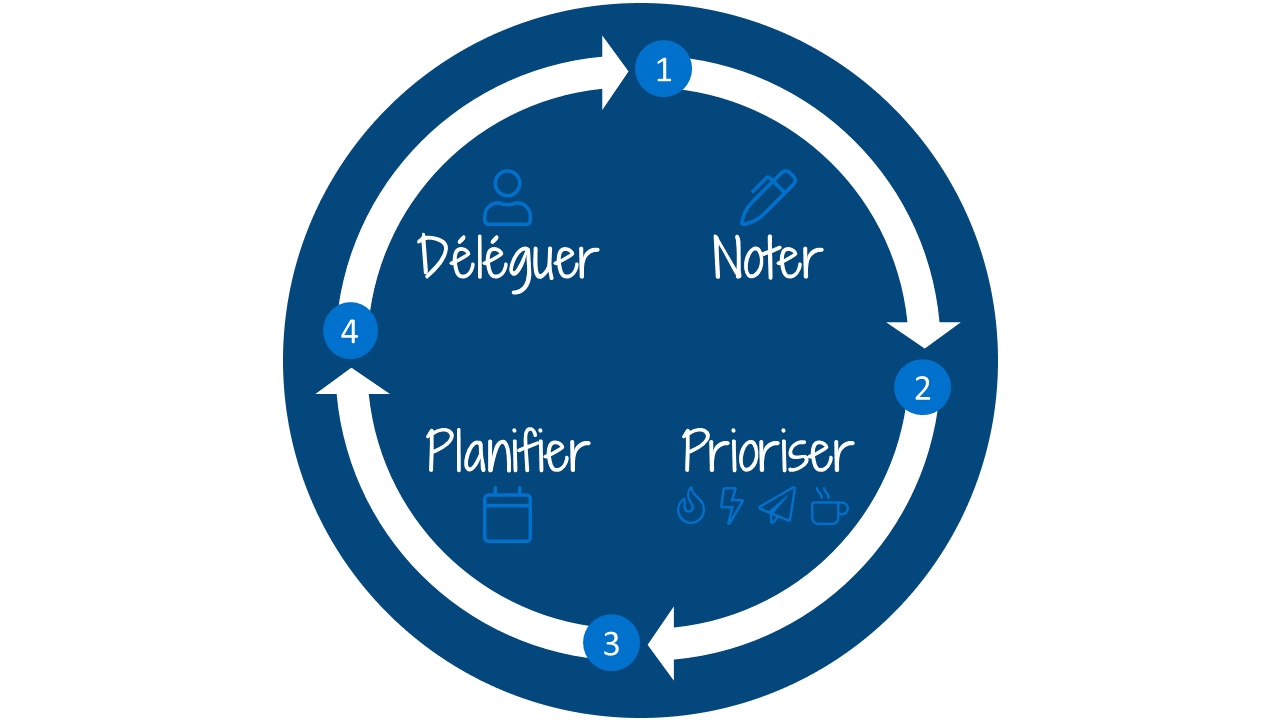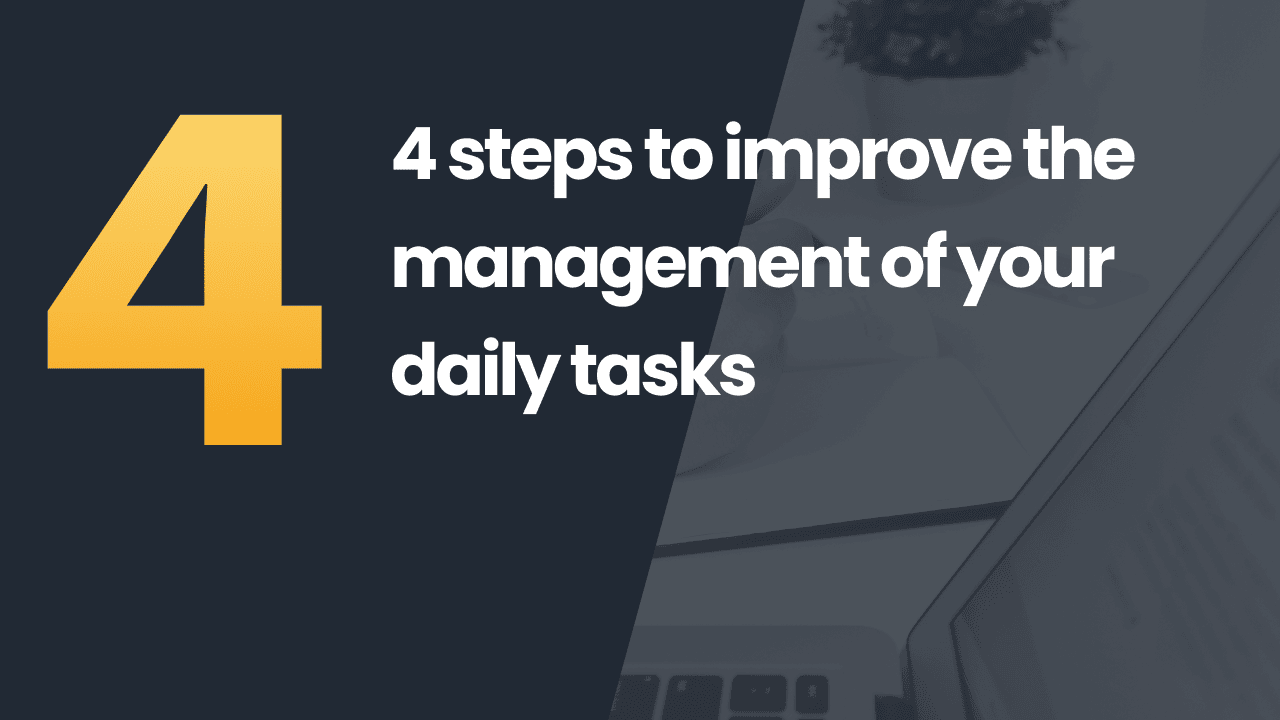Register for our next webinar !
When our workload becomes substantial, getting organized on a daily basis can sometimes seem impossible. How to approach your day positively when you feel overwhelmed by the amount of work and its tasks?
It is not always easy to know where and how to start. To avoid being overwhelmed by stress, simply take a step back: do not jump in head first into the workload! Before starting, take the time to write, prioritize, schedule and delegate tasks. You will necessarily be more efficient and productive. But how to proceed methodically? By following four basic steps, you will approach your work day in a calm and thoughtful manner.

First step: write down what you have to do
Before trying to prioritize and plan, start by checking your emails, your personal notes and the current projects you are participating in to clearly define all the work you have to do. From this global view, break down your work into different tasks, such as a bulleted list. This will help you visualize what there is to do according to each project, work group or department.
Second step: prioritize your tasks
The second step consists in prioritizing tasks, which does not always seem easy at first sight. However, a simple method can help you. When managing different cases, it is important to distinguish between urgent and important tasks. Two adjectives not to be confused! Dwight David Eisenhower, 34th President of the United States, initiated the Eisenhower Method, which stems from his famous quote: “what is important is seldom urgent and what is urgent is seldom important”. How to manage a schedule according to this method? The principle is quite simple and proposes to divide tasks into four categories. According to the Eisenhower Principle, tasks can be:
- Urgent and important; tasks that require immediate attention and that contribute to the achievement of your long-term goals.
- Not urgent but important; tasks that have a deadline set to a more or less long-term and that also contribute to the achievement of your personal goals.
- Urgent but not important; tasks that require immediate attention but do not contribute directly to the achievement of your long-term goals.
- Not urgent and not important; tasks that have no impact on your long-term goals but still need to be addressed.
This distribution of tasks, which should be established according to your goals and needs, will encourage you to work on the urgent and important tasks in priority. In sum, urgent and important tasks are the ones you should address immediately, whereas the not urgent but important tasks are to be planned. The urgent but not important tasks represent tasks linked to the goals of other people (such as tasks to do in the context of a collective project). Hence, you can delegate them to third parties as much as possible. Tasks that are neither urgent or important can be moved to a sort of “suggestion box”. These tasks are not essential at the moment, as they do not have a direct influence on your long-term goals, but they should still be kept in mind. The main idea is that tasks should be frequently reviewed, and their relevance should be analyzed to see if their status is changing.
Third step: plan the important tasks
Once you have determined which are the most important tasks, you can then plan their achievement in the short or long-term according to their degree of urgency. You can first try to organize your week, then divide your tasks according to your working days.
For all important tasks, try to set a planning date according to your time schedule. The planning date represents the date on which you wish to complete the task. It differs from the due date, which puts an end to the deadline. When you decide to schedule your tasks, think about specifying their deadlines if you know the exact due date.
In your work routine, you probably have tasks that recur. Try to determine which are the recurring tasks before defining their frequency: daily, weekly, monthly, annual. This will help you ensure the management of your main activities.
Fourth step: delegate certain tasks
In your daily life, you are likely to collaborate and work in teams. Not important but urgent tasks are probably the ones you could delegate: they are not considered important in terms of your responsibilities but still need to be addressed and completed within a short period of time. These tasks could be the ones that contribute to the achievement of a collective project but that do not depend solely on you. When delegating a task to a colleague, make sure to follow up by adding, for example, a comment that explains why you assigned the task to that person in particular. You can also define a due date to make sure it will be achieved in time. Be as clear as possible in your statement to simplify collaboration.
With this approach, organize your time efficiently.
This method will allow you to plan your time schedule in a realistic way. Avoid overloading yourself by overestimating your daily productivity! Set clear and achievable goals. Address your tasks one by one. From one day to another, check your progress: were your planned tasks completed? If that is the case, it means that your goals were reasonable. If on the contrary, certain tasks have not been completed, try to reduce the number of tasks to achieve per day and try to evaluate the time of achievement of each of them. Good planning will reduce the number of urgent and important tasks that can be a source of stress.
To optimize your organization at work, there are many existing tools that are made to revolutionize your way of managing tasks. Find the solution that works best for you: adopt a single and flexible tool that corresponds to your way of working. This will save you time and improve efficiency.
Would you like to improve your everyday organization?
Related posts
Get the latest tips sent straight to your inbox: Subscribe to our newsletter
Mathilde Sudan



